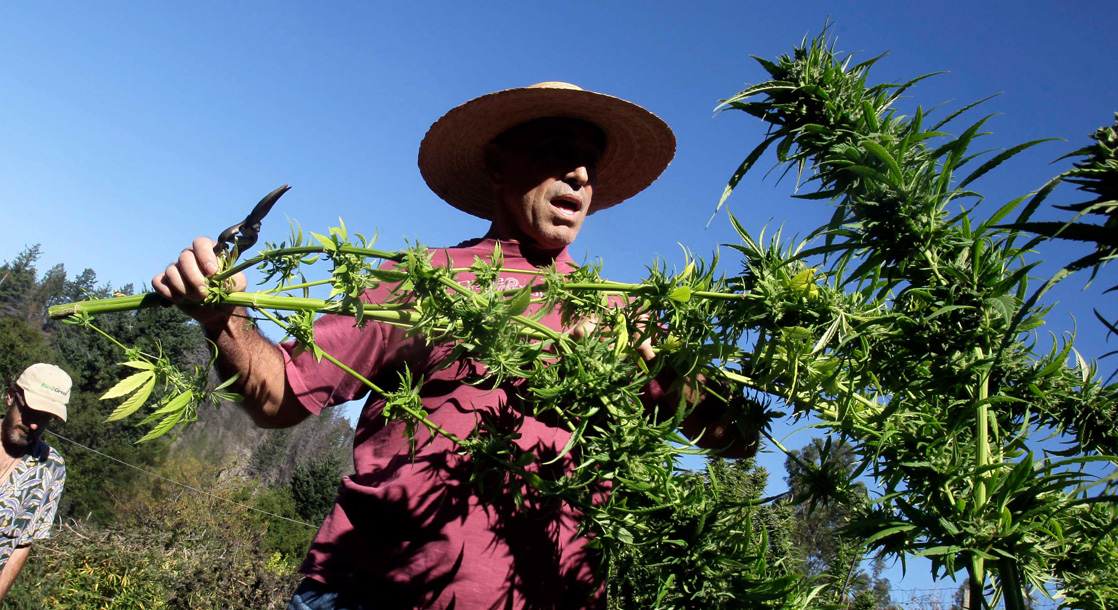Women, weed, and weather: the recipe preferred on the West Coast. The women and the weather are natural phenomenons, but the weed is brought to you by careful cultivation. Right now, growers in California are fighting for the right to grow, as cultivation bans sweep the state and threaten their livelihoods.
When the state passed medical marijuana regulation last September, they gave local jurisdictions the choice to regulate or ban cultivation until state rules came down. Rather than taxing and regulating, many local governments opted to ban cultivation completely. While it’s unclear what effect bans will have on consumers, it is clear they have a real-time impact on growers and their families.
Calaveras County is a good example. Located in the Sierra foothills of California, Calaveras is one of the few counties moving forward with regulation. Last month, the Board of Supervisors issued an emergency ordinance to enforce strict cultivation rules and fees that farmers must abide by beginning July 1.
The measures are not easy on growers, so most illegal grows will be weeded out. In spite of the strenuous new requirements, much of the Calaveras growing community is in favor of the decision to regulate because the only real alternative for the county was a ban. Growers hope the new regulations will allow them to function more like regular business owners. But, the fight for this newfound legitimacy has not been easy.
Jessica Berdechowski, a member of the Calaveras Cannabis Alliance, described her situation in a letter to the Calaveras newspaper. In it she reminds neighbors that growers are members of the community who are working to be treated as equals.
“My family members spent years of their time that they will never get paid for. We invested in property, business and the county, state and federal taxes plus fees to continue to live like other residents here. If you understand what stress is, then you understand this has taken years from us,” she wrote.
Tom Liberty, founder of the Calaveras Cannabis Alliance (originally called Collective Patient Resources), says this entire process – from the initial whispers of a ban to the recently passed ordinance – has taken a toll on CCA.
Liberty especially laments that so much of CCA’s work has had to shift towards politics. He hopes that as the dust settles and the rules become clear, the focus can go back to helping patients.
“We used to have a free medicine program, but that had to be put on the back burner. Now people are begging for it, and I want to get back to that,” Liberty said.

In the meantime, CCA’s leadership is working night and day to help bring the growers of Calaveras into compliance. They are setting up workshops to help farmers navigate the new rules, and they will continue to work with the county government to address concerns from both the pro-cannabis and anti-cannabis communities.
Caz Tomaszewski, the current director of CCA, has been answering calls night and day for the past few months. “It’s impossible to describe the crunch he is under,” Liberty said of Tomaszewski. “Caz has been working 60 hours a week for CCA, which is time spent away from his own garden.” The members of CCA, especially its leaders, have dedicated countless hours of their time and energy into protecting their right to grow medical cannabis, why shouldn’t consumers offer a hand as well?
As more growers come out of the shadows to join the broader community, CCA will need more resources to continue translating legalese into English for the hundreds of growers in the county. Growers in Calaveras need support: they need money for lawyers and the new fees for regulation, and they need help recouping costs for the parts of their gardens lost to the rules in the ordinance.
California growers are being pushed into legal and financial limbo, which is bad for the business of weed, yes, but it's even worse for the patients who need it. California hip-hop artists, rockers, techies, and business people proudly consume California weed, and now the farmers who cultivate the crop are fighting for the right to grow.
It can be hard to find ways to direct frustration as consumers and taxpayers, so what better ally could farmers have than the California cannabis-consuming community?
California growers need help. They need legal support, their alliances need funding, and they need consumers to care what happens to them. While marijuana laws in the U.S. undergo the slow, bureaucratic process of change, people like Jessica live in a reality where “The future is so uncertain, and everyone is in limbo.”
If ever there was a time for California cannabis culture to activate for a cause, it is now.











